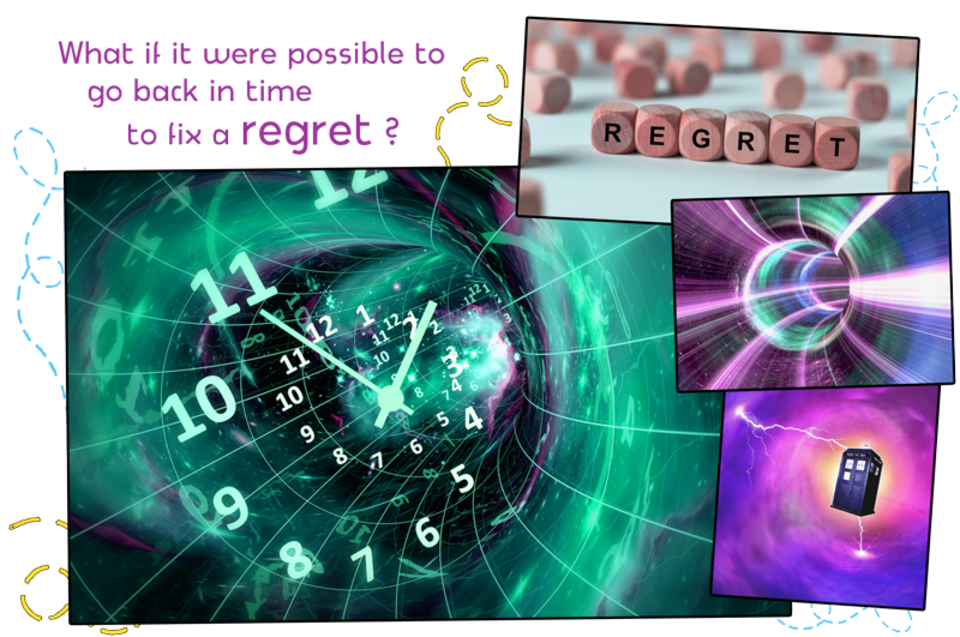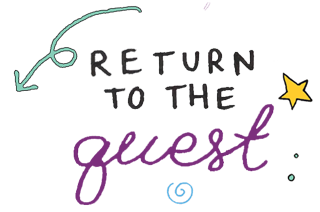
Farewell regrets
| Objective: To envision a completely different universe in order to reveal the hidden dimensions of the concept of regret! |
Duration: 30 to 90 minutes
Material:
- Sheets of paper and pens
- Coloured pencils and markers
Instructions:
Thought experiment: Imagine a world where... we could go back in time to change a life regret. The catch? We would lose everything that’s happened since! What would this world look like? Would it be fantastic or horrible? How would this world be different from ours? How would life change? Would you want to live in this alternate world? Why or why not?
...
- Think about the effects. To help you start brainstorming, select some moments in your life that you would like to revisit in order to change them somehow. Is it a time when you made a decision that you wish you hadn’t? Or a time when you could have acted but didn’t… and wish you had? Then imagine how your life today might be different if those regrets hadn’t happened… nor any of the consequences that followed them! Now think of this power to time travel on a wider scale—everyone in society can fix regrets by changing their past and giving up what’s happened in their life since. Would this be the key to all of our personal and social problems? Why or why not? What might be the consequences—good and bad—of being able to change our regrets but lose the life experiences that resulted from them? Make a list of three positive and three negative points of a life without regret, and add reasons to explain your impressions.
- Variation: Consider how this world might affect life in different contexts, such as: relationships, school, jobs, government, art, religion, the environment, etc.
- Create a character. To deepen your thinking, think about how this alternative world might affect different people in society. Who would most want to go back in time to fix a regret, and why? Would the main motivation be to change negative things, like someone who committed a harmful action, or someone who stood by and let a bad thing happen? Or might some people want to travel to the past to change a regret about something positive? Create a character in this world who would badly want to fix a past regret in spite of losing all that has happened since. Envision the timeline of their life from the moment of their regret to today by drawing a line with dots for each major event and descriptions of how the regret affected it. Now decide what the character decides to change about the regret… and how the whole timeline gets transformed! What is lost and what is gained? How is the character different? Is life better for them? Why or why not? Describe their unique experience in as much detail as possible to help tell this time traveling story!
- Represent this world. Based on your reflections, imagine how you could represent your impressions of this alternative world—through a drawing, a collage, a diagram, a poem, or a dance. Your style can be realistic, abstract, comic, dramatic, etc. How could this world help us better understand—and even improve—our own?
...
Bonus: Close your eyes and picture yourself at the end of your life, looking back on it without a single regret. You’re satisfied and overjoyed at how everything has turned out for you! How did you manage to sidestep any disappointment? Well, imagine that it’s because you were asked right this moment to prepare a Regret Refrainer—a special document that reveals the top things you want to experience while you’re alive… in the form of a list of regrets you do not wish to have. For example, if you can’t imagine life without your best buddies, you might write: “I wish I had stayed in touch with my childhood friends” to make sure you always stay close. Or if you don’t want to miss a chance to work with the people you admire, you might write, “I wish I had the courage to meet my role model.” To get started, think of what regrets you would like to avoid, then write them out as fives wishes by filling in the blanks:
|

| Tricks for tots: Regrets don’t have to be about big life moments—they can also happen in simple, silly ways! Play around with this concept by pretending you have the power to rewind any minute that goes wrong for you in some way. Did you accidentally drop your glass of juice? Oh no! Reeewind and imagine starting over. Did you mistakenly scream during your parent’s important work call? Ooop! Reeewind and picture yourself restarting. Try this throughout the day then have a think about it: What kind of minutes are you rewinding and why? Is what you imagine happening better than what actually happened? Why or why not? Are regrets helpful? Are there things we should not regret? Hmm… imagine if you could make a Reality Rewinder! How would it work and why? |
| Tips for teens: According to Socrates, if we have a limitless appetite of desire for any and all things, we can wind up feeling regretful because we are unable to get satisfaction by achieving everything we want. By contrast, if we have a philosophical soul, we seek to want what is best, which is easier to satisfy so long as we have the freedom to do so—if we’re not able, that desire will no longer seem best and instead get replaced by a better option. If we apply this idea to current times, a symptom of a limitless appetite might be FOMO—that is, the fear of missing out; that uneasy feeling we get when we want something that is happening elsewhere or that is different than what we’ve chosen. If we desire altogether too many things, we seem doomed to dissatisfaction when we inevitably can’t experience them all. Conversely, the more recently coined JOMO (or the joy of missing out) may be representative of the Socratic philosophical soul—that feeling of liberation from being content with what you have because you know you were seeking the best for yourself in your life right now. What do you think about these twin notions? Is FOMO necessarily bad—should we desire less and focus on what’s best? Is JOMO the antidote to FOMO—the cure to wanting too much or the path to a regret-free life? Think of some moments when you felt FOMO and others when you felt JOMO, then ask yourself: when did you feel most satisfied and why? |
Share your creative reflections by sending them via email.
Include photos of your projects and notes of your thoughts, as well as your first name and your age!


